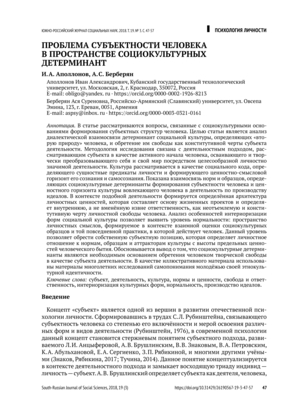Abstract
The paper deals with the issues related to socio-cultural foundations of human subject structures formation. The aim of the paper is to analyze the dialectical relationship between the determinants of social culture that determine Man’s “second nature” and attainment of freedom – a constituent characteristic of actor. The methodology of the research is based on the activity approach that regards Man as actor who masters and transforms himself and his world through rational and significant personal activity. Culture isregarded as a social code that determines essential predicates of an individual and shapes the axiological level of his consciousness and self- consciousness. The paper features the interrelation between the norms and the patterns that act as socio-cultural determinants of human subjectivity formation and serve as value-based level of culture that helps Man generate ideals. Within this activity, a specific set of personal values — those that make up the basis of life and determine integral, not imposed, responsibility as an inherent and basic characteristic of personality freedom, is shaped. Interiorization analysis of social culture forms allows to reveal the level of “normalcy” in the area of personal cultural meaning and personal meaning formed against the background of mutual evaluation of socio-cultural patterns and Man’s everyday life. As a result, it becomes possible to obtain actor’s own s attitudewhich determines Individual’s attitude to norms and patterns and cultural attractors from the peak of ultimate values of Man’s being. The author of the research substantiates the conclusion that socio-cultural determinants are necessary grounds for Man as actor to acquire freedom of constructive endeavor. The research contains materials of long-standing that illustrate how young people self-comprehend their ethno-cultural identity.
Keywords
References
- Antsyferova, L. I. (2000). Psikhologicheskoje soderzhanije fenomena sub’’ekt i granitsy sub’’ektno-dejatel’nostnogo podkhoda. [Psychological Content of the Phenomenon “Subject” and the Boundaries of the Subject-activity Approach]. In A. V. Brushlinskij, M. I. Volovikova, V. N. Druzhinina (Eds.) Problema subekta v psihologicheskoj nauke [The Problem of “subject” in Psychology] (27–42). М.: Akademicheskij prospekt.
- Apollonov, I. A., Karnaushenko, L. V., & Tuchina, O. R. (2009). Jetnokul’turnyje normy i tsennosti v formirovanii samoponimanija molodezhi (na primere russkih i adygskih studentov kubanskih vuzov) [Ethno-cultural Norms and Values in Shaping Young People’s Self-comprehension (as Exemplified in Russian and Adyghe Students Experience in Kuban Universities)]. Krasnodar: Izd-vo KrU MVD RF.
- Bahtin, M. N. (2008). Filosofija kak zhivoj opyt. Izbrannye stat’i [Philosophy as a Living Experience. Selected Papers]. Moskva: Labirint.
- Brushlinskij, A. V. (2003). Psikhologija sub’’ekta [Psychology of the Subject]. Moskva: Institut psihologii RAN.
- Bugental, J. F. T., & Kleiner, R. (1993). Existential Psychotherapies. In G. Stricker, L. Gold (Eds.) Comprehensive Handbook of Psychotherapy Intergration. New York: Plenum Press.
- Campbell, R. L., Christopher, J. C., & Bickhard, M. H. (2002). Self and values: An interactivist foundation for moral development. Theory & Psychology, 12, 795–823.
- Filer, A. Ja. (2012). Nauki o kul’ture posle postmoderna. Postfuturologija [Sciences of Culture after Postmodern. Post-Futurology]. Observatorija kul’tury [Culture Observations], 2, 4–11.
- Gofman, I. (2003). Analiz frejmov: jesse ob organizacii povsednevnogo opyta [Frame Analysis: an Essay on the Organization of Experience]. Moskva: Institut sociologii RAN.
- Leont’ev, D. A. (1996). Cennost’ kak mezhdisciplinarnoe ponjatije: opyt mnogomernoj rekonstruktsii [Value as an Interdisciplinary Concept: Experience of Multi-dimensional Reconstruction]. Voprosy filosofii [Questions of Philosophy], 4, 15–26.
- Mamardashvili, M. K. (1996). Neobhodimost’ sebja [Necessity of Self]. Moskva: Labirint.
- Martin, J. (2004). Self-Regulated Learning, Social Cognitive Theory, and Agency. Educational Psychologist, 39 (2), 135–145.
- Mikhajlov, F. T. (2002). Problema “subject-Object” ili poisk sub’’ektom svoikh predikatov [The Subject-Object Problem, or the Subject in Search of Predicates]. In Sub’’ekt. Poznanie. Dejatel’nost’ [Subject. Cognition. Activity] (pp. 377–398). Moskva: Kanon+ OI “Reabilitacija”.
- Petrovskij, V. A. (2010). Chelovek nad situatsiej [Man above the Situation]. Moskva: Smysl.
- Reznik, Ju. M. (2009). Chelovek za granicami kul’tury i social’nosti: transpersonal’nost’ kak predmet social’noj teorii (metafizicheskie osnovanija). [Man Beyond the Boundaries of Culture and Sociality: Transpersonality as Object of Social Theory (Metaphysical Grounds Basis)]. Voprosy social’noj teorii [Questions of Social Theory], 1 (3), 179–195.
- Rezvykh, P. V. (1996). Bytie, sushhnost’ i sushhestvovanie v pozdnej ontologii G. V. J. Shellinga (k shellingovskoj postanovke problemy tvorenija). [Social Being, Essence and Human Existence in G. V. Y. Shelling’s Late Ontology (About Shelling’s Posing the Problem of Creation)]. Voprosy filosofii [Questions of Philosophy], 1, 110–123.
- Rjabikina, Z. I. (2005). Lichnost’ kak sub#ekt bytija i so-bytija: psikhologicheskij aspekt analiza [Personality as Object of Existence and Co-existence: Psychological Aspect of Analysis]. In Lichnost’ i bytie: sub’’ektnyj podkhod. Lichnost’ kak sub’’ekt bytija: teoretiko-metodologicheskije osnovanija analiza [Individual as Object of Existence: Theoretical and Methodological Foundations of Analysis] (5–21). Krasnodar: KubGU.
- Rubinshtejn, L. S. (1997). Izbrannyje filosofsko-psikhologicheskije trudy. Osnovy ontologii, logiki i psikhologii [Selected Philosophical and Psychological Papers. Fundamentals of Ontology, Logics and Psychology]. Moskva: Nauka.
- Rubinshtejn, S. L. (1976). Problemy obshhej psihologii [Issues of General psychology]. Moskva: Prosveshchenije.
- Sugarman, J., & Martin, J. (2011). Theorizing Relational Agency: Reactions to Comments. Journal of Constructivist Psychology, 24 (4), 321–323.
- Tuchina, O. R. (2013). Samoponimanije lichnost’ju svoej jetnokul’turnoj identichnosti: sub’’ektno-bytijnyj podkhod [Actor’s identity: Self-comprehension of Ethnic and Cultural Identity (Subjective and Existential Approach)]. Krasnodar: KubGU.
- Tul’chinskij, G. L. (2007). Svoboda — jepifenomen kul’tury? [Is Freedom an Epiphenomenon of Culture?]. Retrieved from: http://hpsy.ru/public/x2919.htm
- Zinchenko, V. P. (2001). Psikhologicheskaja teorija dejatel’nosti. [Psychological Theory of Activity]. Voprosy filosofiji [Questions of Philosophy], 2, 81–83.
- Znakov, V. V., Rjabikina Z. I. (2017) Psihologija chelovecheskogo bytija [Psychology of Human Existence]. Moskva: Smysl.
 Русский
Русский


